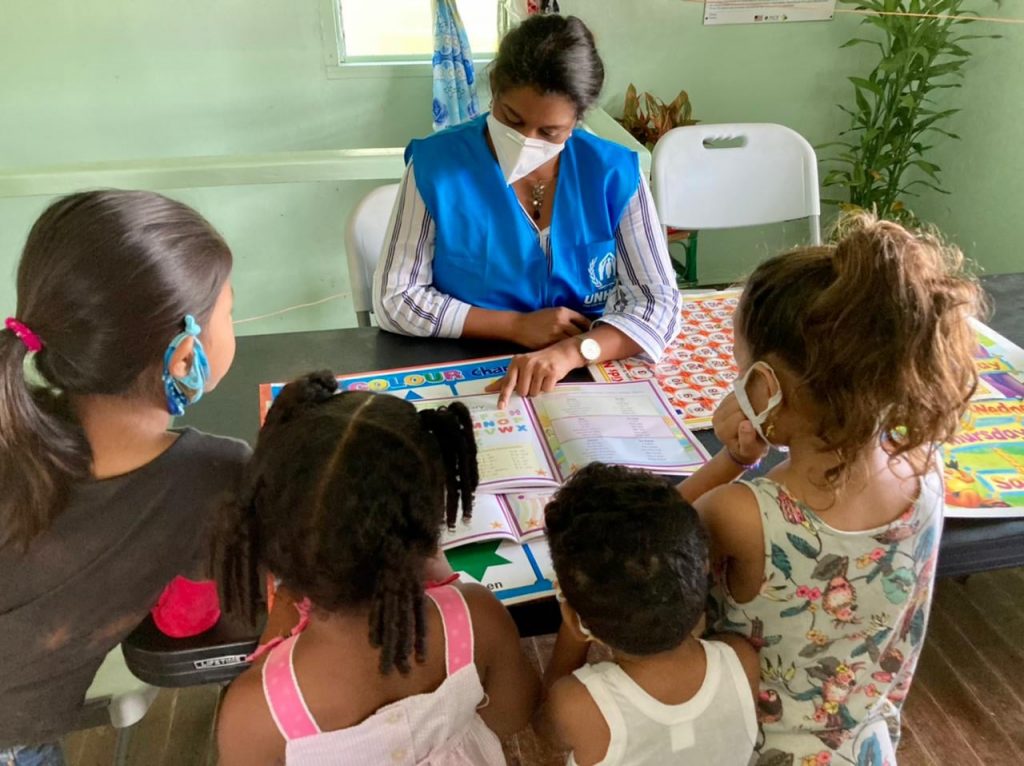Guyana not offering refugee, asylum status to migrants but humanitarian aid is extensive
By Kurt Campbell
The latest estimates indicate that there are over 30, 000 Venezuelan migrants in Guyana with the overall figures expected to be higher but despite the majority of these persons fleeing social and economic hardships in their homeland, Guyana has not been and will not be granting refugee or asylum status to these persons.
With the emergent situation in place since about 2017, successive governments have not been involved in any widespread deportation of migrants either, although many of the migrants have crossed the border illegally and, in other cases, have overstayed the time permitted.
The Guyana Government is less concerned about deporting migrants and more interested in knowing who is here and what they are doing here.
The approach instead is one of extensive humanitarian aid with continuous efforts to ensure that these persons are captured in immigration records and then the provision of social services in the form of healthcare and education but beyond that, housing and employment.

Guyana will be tasked with reporting on this situation to several international bodies later this year and a comprehensive report is currently being complied by the Ministry of Governance and Parliamentary Affairs.
On Wednesday, subject minister Gail Teixeira said it will be an interesting document to examine.
She was asked by the News Room to articulate the government’s position on the peculiar migrant situation in Guyana.
But Teixeira believes that to understand the government’s policy and position, one that has been consistent since 2017, the contextual history of the situation should first be understood.

Those Guyanese were not turned back, they were allowed to integrate, find jobs, become married and birth children.
And now, Teixeira believes that about a quarters of those persons coming to Guyana from Venezuela are Guyanese, of Guyanese parentage or altogether Guyanese descendants.
She believes that if other countries were accommodating to Guyanese migrants in the past, then Guyana can do the same for others now.
It is on this basis, coupled with efforts to build the local workforce at a time of unprecedented transformation and ultimately increase the Guyanese population which is currently documented to be below one million people that the government has settled on extending its humanitarian approach.
“We have not changed the policy implemented by the former government. We have added to it in a number of ways.
“What Guyana declared is a humanitarian approach to migrants from Venezuela,” Teixeira said.

NO REFUGEE STATUS
Guyana has not signed onto or ratified the 1951 United Nations Refugee Convention which provides the internationally recognized definition of a refugee and outlines the legal protection, rights and assistance a refugee is entitled to receive.
The UN Refugee Agency (UNHCR) for which an office was established in Guyana, help governments translate the convention into national laws to ensure refugees are protected and can exercise their rights.
But according to Teixeira, the government has insisted to UNHCR and even the International Organization for Migration (IOM) not to call these migrants from Venezuela refugees.
“We do not offer refugee status to anyone or asylum.
“People coming here can’t claim those status… some may go to the UN body to claim refugee status and the UN system goes into a process of due diligence where such status is granted for a specified time.
“We have asked over and over again how many people they have given [refugees status] and we have been unable to get the numbers.
“That matter is still in discussion between the government UN bodies,” Teixeira explained.
Notwithstanding, it was repeated that migrants from Venezuela and other countries will be allowed into Guyana and given free healthcare and education.

“Where there is squatting, we have tried to ensure the conditions under which they live are not horrific and we are assisting them settle down and integrate. A number of studies were done by IOM that reflects the situation on the ground.
Teixeira said although Guyana is receiving many of the ordinary working class migrants, most have technical qualifications that are proving useful in the changing Guyanese economy – an emerging oil producer with development fast paced in all productive sectors.
There have also been growth in the number of small businesses set up by migrants and the birth of new cottage industries.
“That does not worry us because we know this is what immigrant populations do,” the minister said.
GUYANESE CITIZENSHIP FOR MIGRANTS
Teixeira used the opportunity to reject claims that a large number of Venezuelans are being granted Guyanese citizenship, a situation that can see them voting in general elections.
According to her, factually, there have been no surge in the number of people being granted citizenship but even so, she reminded of the legal pathways towards becoming a Guyanese.
You can become a citizen after living in Guyana for five consecutive years, by marriage or by birth.

And while there have been efforts to ensure there aren’t marriages of convenience, the law also allows for a Commonwealth citizen living in Guyana for one year to become a Guyanese citizen.
“This is what migration is about and for us, it provides persons bringing skills we may not have and we can use to develop our country.
“People feel migrants are taking over but then we have to ask our people, when last have you applied for a job?” Teixeira quizzed.





